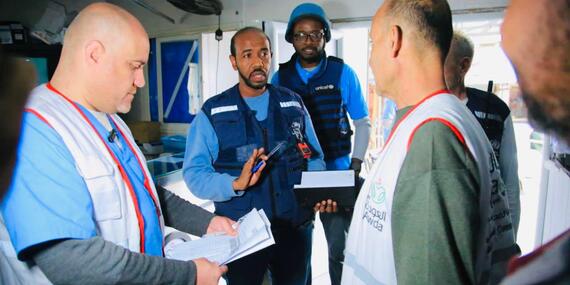Today's top news: Occupied Palestinian Territory, Ukraine

Occupied Palestinian Territory
A team – comprising the World Health Organization (WHO), OCHA, UNICEF and the UN Population Fund – visited the Al Awda and Kamal Adwan hospitals in northern Gaza yesterday to deliver fuel and essential medical supplies.
The visits were the first to those hospitals since early October – despite our ongoing efforts to gain more regular access to the north of Gaza.
The team delivered 9,500 litres of fuel to each hospital – but that is just a fraction of what is needed.
In a social media post, WHO’s Director-General Dr. Tedros Adhanom Ghebreyesusspoke of “grim findings” during the team’s visit, including severe levels of malnutrition, children dying of starvation, hospital buildings destroyed, and serious shortages of fuel, food and medical supplies.
Kamal Adwan Hospital is the only paediatrics hospital in northern Gaza – and it is overwhelmed with patients. Dr. Tedros said the lack of electricity poses a serious threat to patient care – and the lack of food led to the deaths of 10 children.
In a statement yesterday, UNICEF warned that the child deaths we have feared are now here, as malnutrition ravages the Gaza Strip.
UNICEF’s Regional Director for the Middle East and North Africa, Adele Khodr, said the widespread lack of nutritious food, safe water and medical services is a direct consequence of the impediments to access, and that aid restrictions in the north are costing lives.
Meanwhile, in southern Gaza, OCHA says airstrikes continue to be reported, including in Rafah, where on Saturday dozens of people were reportedly killed and injured when tents sheltering displaced people in front of Al Emirati field hospital were hit. Two of the fatalities were said to be health workers.
WHO Director-General Dr. Tedros described the incident as “outrageous and unspeakable” and underscored that health workers and civilians must be protected at all times.
For his part, the Humanitarian Coordinator, Jamie McGoldrick, began a two-day visit to Gaza today. Today, in Rafah, he met with community leaders and others, who expressed their concerns over the impact of the crisis on women's health, as well as a potential lost generation of children, who have been out of school for months. Mr. McGoldrick will speak to you virtually, after his mission concludes, from Jerusalem on Wednesday.
And Sigrid Kaag, the Senior Humanitarian and Reconstruction Coordinator for Gaza, has just completed a two-day visit to Egypt. While there, she met with the Foreign Minister, the Minister of Finance and the Minister of Social Solidarity. She also met with Ahmed Aboul Gheit, Secretary General of the League of Arab States. In her meetings, Ms. Kaag discussed the various avenues to ensure that aid urgently reaches civilians in need across Gaza, as well as the need to swiftly implement Security Council resolution 2720.
Ukraine
Attacks and hostilities persisted over the weekend and into this morning in Ukraine, resulting in casualties and significant damage to civilian infrastructure across the country. The city of Odesa, as well as the town of Kurakhove in the Donetsk Region, were worst affected by this latest wave of attacks.
On Saturday, a strike in the city of Odesa killed 12 people, including five children, one as young as four months old, and caused injuries, according to Ukrainian authorities. A residential building was severely damaged, disrupting power to nearby structures. Rescue efforts continued over the weekend to retrieve bodies, including those of children trapped in the rubble.
Strikes on Sunday injured more than a dozen civilians, including two children, and damaged several apartment buildings in the towns of Kurakhove and Pokrovsk in the Donetsk Region. The same day, authorities in the Kherson and Dnipro Regions reported additional injuries and extensive damage to civilian infrastructure.
Attacks in the Sumy, Zaporizhzhia, Mykolaiv and Kharkiv regions also damaged homes and civilian infrastructure – including a hospital, schools, gas facilities and electrical equipment.
Our humanitarian partners responded quickly to the attacks, particularly in worst-affected areas, including the city of Odesa. They provided psychosocial and legal consultations and distributed emergency shelter kits to families whose homes were damaged. Over the weekend, aid workers provided similar support to those affected by attacks in the Kharkiv and Donetsk regions.
